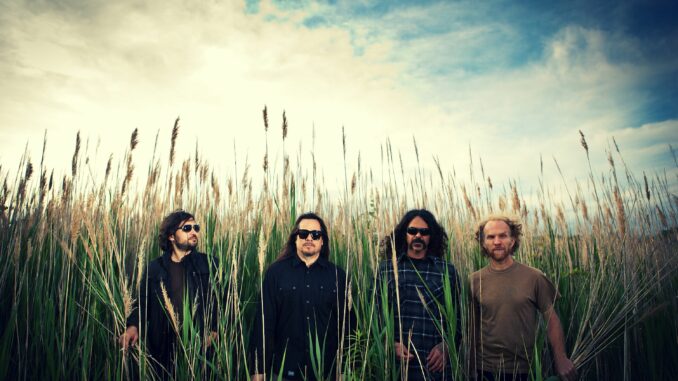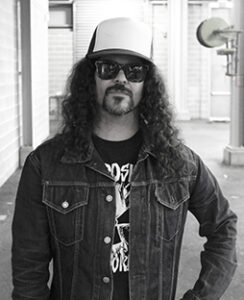

Rocking out since he was old enough to hold a guitar in his hands, Brant Bjork wears many hats today, including drummer, bassist, vocalist and producer. He’s been in more bands than we should cram into one sentence, but these days he drums for Vista Chino, the newly named Kyuss Lives!, hailing from Palm Springs, California U.S.A. Bernie Burke sat down with the man himself just before his set at the Sydney Big Day Out, 2014.
Well, I discovered the Ramones when I was very young, and I was the youngest of all the kids in my neighbourhood. They kinda had fun turning this kid onto the things they were into, which was bands like Kiss, Queen, the Ramones and stuff like that. One of the guys in the neighbourhood was in a punk band called the Swankers; I used to go watch him rehearse, it woulda probably been around ’82.
Shortly after that I got together with a couple of the other guys in the neighbourhood that were closer to my age, and we just started a band. We wanted to be like them. And that was it, I was just about 10 or 11…played my first gig at 13. It was like all we did. It was in the desert – there was nothing else to do. You know, that’s what we did…it’d be like a kid living on the beach who goes surfing. Kind of, it’s there and so you do it.
As an adult who’s been in cities now, you must look back and think what a beautiful time that was.
It was beautiful. We kinda suffered through it in our formative years, because we felt like we were deprived of this urban experience, being close to all that which was inspiring us…but you know, in a real beautiful, ironic way we’ve come to realise that it was a pretty unique thing, and I’m actually quite grateful for that.
Speaking of grateful, tell us about the new album, Peace. It’s a lovely title.
Well you know, this record was obviously conceived through conflict. Of all the records I’ve made in my career, and I’ve made quite a few – I’d never experienced that. I literally had this opposing force trying to stop it, this creative thing. It was a really strange and just awkward experience.
But in a lot of ways it kind of fuelled our passion…to just continue fighting and doing what we love. And when it was all over and we had accomplished what we set out to do, I thought, you know…I don’t wanna listen to this record 20 years from now and have it be referred to as this record that was a very intense, dark trying time. I thought well with the title ‘peace’…the record deserves a name that years from now won’t have any negative connotations. And [it describes] the conclusion of it all. There was a sense of relief about it.
You’re a producer as well as a multi-instrumentalist. What do you look for in music when you’re in that role?
Well it always depends on the music, the songs, the artist, the studio. I produced my own records for years, but I think working with other bands, I would say I’m still just developing my skills as a producer. I’ve still got years to go .
Was that the next logical step for you?
Yeah, I like producing, I really do. This particular record, Peace… I mean it was just all about getting closer to the roots of the music that originally inspired us, which was classic rock, and classic punk rock. And then even going deeper into like the heart of jazz records and blues records. You know, this is an art form that kinda revolved around – especially for rock – an analogue era. And that’s the era that we come from, so as a producer, I wanted to continue to work in that vibe, and we just created what I feel is a really organic and honest rock record.
How do you get into your zone of creativity?
I just think that it’s really not a sophisticated thing. I think it’s really simple. I mean you know, I’ll see a classic movie that I enjoy, or I’ll hear a song play from a band that I really like, and I just get excited like a kid. You know, I just think “Oh!…I just wanna participate.”
I didn’t have ambitions as a young kid to become this mind-blowing, important, you know, artist that has to take the people to this whole new way of understanding or whatever. I was a kid who just wanted to play punk rock. Party and rock and roll man…you know…it was lets get involved…live life.
Like if I see a kid who’s skateboarding, and he’s got a cool style, I’ll be like “Oh man, I gotta go write a song.” You know? Like that’s all. Real simple.
What do you like to do in Australia when you’re not playing gigs?
I got good friends here, and we just like to go out and drink beer, goof off, you know. The asian food here is just awesome. So I enjoy going out for a good chinese, thai food, just going out to some cool bars and meet people. Just get a vibe with some of the local trips. I’m not really the adventure type. I don’t go skydiving or anything like that, you know.
I guess it’s nice to find out what the locals do.
Well that’s what I like. I grew up in the middle of the desert, so I got enough nature growing up. I like to discover the human experience, you know. I’m one of those people that digs the fact that we’re all different. Even though I know there’s a whole concept that we’re all one, and we’re all the same and that’s rad…I believe that to some extent too. But I get off on the fact that we’re all different. So when I’m in a different country I wanna trip out on how the people are here, how they move, how they think, and what they’re into. So I can get in with the vibe of where I’m at.
Any parting words for your Aussie fans?
Well the record’s been out for a while, it’s doing great, the fans are really really taking to it…they appreciate it, and we appreciate that. We’ve been touring hard, for months and months now, and it’s been great, you know. And now here we are at the Big Day Out – it’s awesome.
